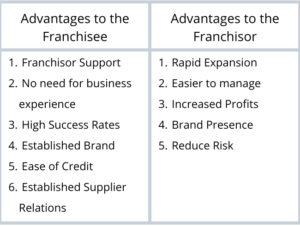FRANCHISE AGREEMENTS: An Introduction
INTRODUCTION

A franchise agreement is an agreement whereby a company/business (franchisor) licenses, its know-how, procedures, intellectual property, business name, branding, get-up, and all rights to sell branded products and licenses to another business (franchisee).
A franchise agreement is a model that often benefits the franchisor, as the franchisor gets to expand its business to new territories while riding on the back of another business. As this article intends to show, franchise arrangements often benefit the franchisor more than the franchisee. A franchisor is often an established business in a specific market, while the franchisee is a new entrant. A franchisee will thus pay a certain amount of money called the franchise fee to the franchisee, for the franchisor to allow the franchisee to trade using the franchisor’s business model.
Impact of a Franchise Agreement to a Franchisor

A franchise agreement, once executed, grants a franchisee, the ability to enter the market with relative ease, by taking advantage of the franchisor’s already established business model. The franchisee will also benefit from technical and business support from the franchisor.
However, the franchisee will be spending its capital and manpower to expand the franchisor’s business. A greedy franchisor will wait for the duration of the franchise to lapse, after which the franchisor can opt to fail to renew the agreement. The franchisor can then opt to buy out the franchisee asset and continue running the business to the exclusion of the franchisee.
Impact of a franchise arrangement to a franchisor

A franchisor is the biggest beneficiary of a franchise agreement. A franchise agreement enables the franchisor to expand business without any capital input and without any liability. The donkeywork is done by the franchisee. Once the franchise agreement comes to an end, the franchisor can simply buy off the assets of the franchisee, without little or no goodwill paid, and then continue managing the business.
ESSENTIALS OF A FRANCHISE AGREEMENT

Just like any other agreement, a franchise agreement is subject to the law of contract. That means there must be an offer from one party (often the prospective franchisee) to the other ( the franchisor). The offer must be accepted, money must be paid (the franchise fees), the parties must intend to create legal relations by reducing the document to writing, and both parties must have the pre-requisite capacity to contract.
In addition to the above, a franchise agreement will have the following necessary features
1.0 Scope of the agreement
The franchise agreement would need to specify the scope of the agreement. The exact nature of the relationship between the franchisor and the franchisee will be outlined in clear terms. The duties and expectations will be set out together with the scope of performance of the agreement. Licensing and transmission of intellectual property such as patents and trademarks will need to be covered. A separate article discusses the various licensing and transmission modes.
2.0 Duration of the Agreement
The agreement must specify the duration of the franchise. It will also specify the modes of termination of the agreement, as well as the rights of each party once termination has been done.
3.0 Franchise Fee
The agreement must specify the amount payable in franchise fees, the duration when payment is due as well as the mode of payment of the fees. All incidental fees such as permit fees would need to be included in the franchise fee.
4.0 Site Selection
The agreement would detail the process and mode of site selection. Normal franchise agreements require the franchisee to select the site and then seek approval of the site from the franchisee. A common source of dispute occurs when the franchisor withholds granting site approval unjustifiably or seeks to withdraw such approval once granted. The franchise agreement would need the necessary provisions worded so as to prevent the “bullying” of a franchisee by the franchisor.
5.0 Quality Assurance and training
The agreement would need to set up the necessary quality assurance checks and balances. Franchise agreements only work when the standard of quality of the franchisor’s business, is upheld by the franchisee. Thus, there is always a need for continuous training by the franchisor to the franchisee for quality control. The duration and frequency of the trainings would need to be specified in the agreement. The agreement would also need to have a provision for both random and systematic quality checks by the franchisor.
6.0 Limitation of liability
A franchise agreement would need to have a provision specifying the nature of liability of each party over the other party’s actions. This is usually important since, in the eyes of the public, the franchisor and franchisee’s business are one and the same.
7.0 Dispute Resolution
The agreement would need to specify the mode of dispute resolution for franchise agreements. The most common mode of dispute resolution is arbitration. You can read more about the utility of arbitration as a commercial dispute resolution method through the following link: COMMERCIAL ARBITRATION – Begi’s Law
CONCLUSION

Franchise agreements are good avenues for business expansion. This is more so for the franchisor. A carefully drafted franchise agreement holds the key to a successful mutually beneficial franchise relationship.


hello I need you blog financial services and payment systems in kenya or any guidelines you might have for some exam purpose please